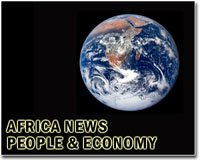 |
Kano, Nigeria (UPI) Jan 31, 2011 Dozens of people have been reported killed in renewed fighting between Christians and Muslims in Nigeria's troubled north, heightening fears the bloodshed will worsen as Africa's most populous nation braces for divisive elections in April. At least 35 people have been slain in the flash-point city of Jos over the last few days, police reported. Military forces in the region were ordered to shoot to-kill suspected troublemakers. The sectarian violence in the key African oil producer followed the death Friday of a leading candidate for the governorship of Borno state in a suspected assassination ahead of the polling. Modu Fannami Gubio, running on the ticket of the All Nigerian People's Party which rules in Borno, was killed by four gunmen on motorcycles outside his father's home in Maiduguri, the Borno state capital. Gubio's younger brother and five bodyguards and political aides were also killed. Borno Police Chief Mohammed Jinjiri Abubakar called it "a political assassination." The killing bore all the hallmarks of Boko Haram, a Muslim extremist group that launched an uprising in July 2009 and has been blamed for much of the region's sectarian bloodletting. Boko Haram, which means "Western education is sacrilege" in the local Hausa language, has frequently attacked security personnel with gunmen on motorcycles. Several thousand people have died over the last couple of years, with 500 being killed in religious and ethnic violence in the Jos area already this year. Gubio's killing was the highest-profile slaying in the run-up to the elections, which include the presidential, parliamentary and state races. But political tensions are rising by the day. Boko Haram claimed responsibility for a string of Christmas Eve bombings that killed at least 85 people around Jos, although security authorities suspect political rivalries may have been the cause. Several churches were hit. Nigerian politics often erupt into violence, with political barons marshalling their own militias to intimidate opposing factions. The country was torn by a civil war in Biafra in 1967-70. Those divisions persist even after Nigeria ended two decades of military dictatorship in 1999. The population of 150 million is roughly split evenly between Christians in the oil-rich south and Muslims in the north. Violence has been endemic since Nigeria gained independence from Britain in 1960 and tens of thousands of Christians and Muslims have been killed. The country has undergone a new wave of political turmoil since mid-2010 when President, Umaru Yar'Adua, a northerner elected in 2007 in Nigeria's first civilian-to-civilian transfer of power, became ill and died. That created a power vacuum since he had not designated a successor. Eventually his vice president, Goodluck Jonathan, a southerner, took over and is running for election as the ruling People's Democratic Party's candidate. Under a political agreement between the country political power brokers, north and south alternate in the presidency every eight years, or for two terms. Yar'Adua hadn't finished his term when he died of heart problems last May and the northerners claimed they should have held onto the presidency under the term of that deal. The supreme court's ruling that Jonathan succeed Yar'Adua has given a sharper edge to the traditional north-south rivalry -- and the prospect of violence, another security challenge to Jonathan's harassed administration which has been unable to halt the killings. Tensions have been fueled by technical problems with registration of the estimated 70 million voters, and exacerbating religious tensions in some areas in the northern and central regions. In the southern oil zones of the Niger Delta, Jonathan faces the threat of a renewed tribal-led insurgency in which the rebels' main target is the oil industry, the largest in Africa, which provides 90 percent of state revenues. Before a cease-fire in mid-2009, insurgent attacks had slashed oil production 40 percent to 2 million barrels a day. The cease-fire, engineered by Yar'Adua, has been unraveling in recent months with sporadic attacks by the insurgents. Jonathan has managed to keep the lid on much of the time, due in part to his southern identity. But in the past, political bosses have recruited the insurgents during election campaigns to do their strong-arm work.
Share This Article With Planet Earth
Related Links Africa News - Resources, Health, Food
 North Africa faces 'demographic tsunami': Bildt
North Africa faces 'demographic tsunami': BildtDavos, Switzerland (AFP) Jan 29, 2011 The countries of North Africa face a "demographic tsunami" of restless young people that must be met by democratic reform, Sweden's Foreign Minister Carl Bildt warned Saturday. Amid ongoing popular revolts in Tunisia and Egypt, Bildt said all the countries in the region would have to find ways to satisfy the demands of growing and increasingly frustrated young populations. "There's a de ... read more |
|
| The content herein, unless otherwise known to be public domain, are Copyright 1995-2010 - SpaceDaily. AFP and UPI Wire Stories are copyright Agence France-Presse and United Press International. ESA Portal Reports are copyright European Space Agency. All NASA sourced material is public domain. Additional copyrights may apply in whole or part to other bona fide parties. Advertising does not imply endorsement,agreement or approval of any opinions, statements or information provided by SpaceDaily on any Web page published or hosted by SpaceDaily. Privacy Statement |